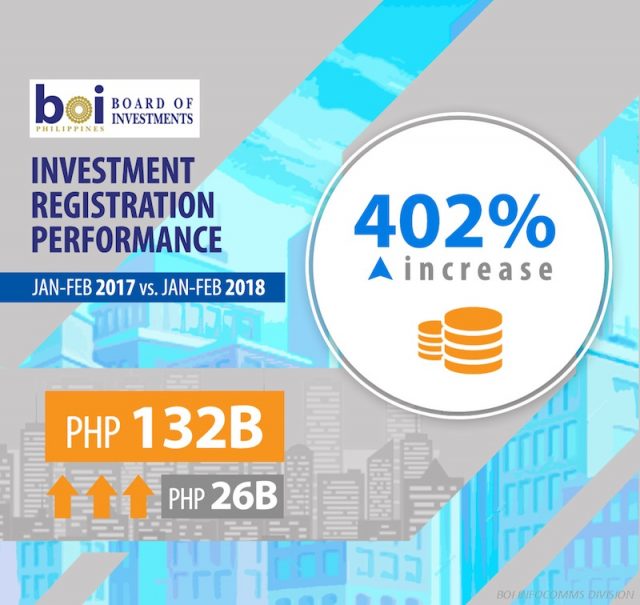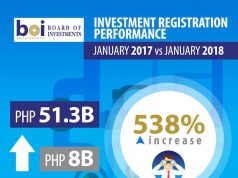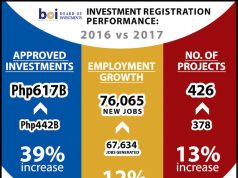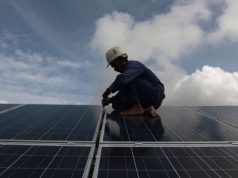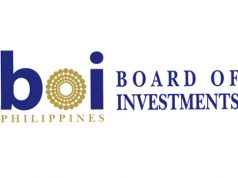MANILA – Investment projects approved by the Philippine Board of Investments in January to February 2018 recorded P131.6 billion worth of projects, up by 402.3 percent compared to the same period last year, BOI reported Monday.
“The sound policies of the government and the strong investor sentiment continues to fuel the growth momentum of the economy as we continue to generate projects and create more jobs for our countrymen,” Trade Secretary and BOI Chairman Ramon Lopez said.
These projects are riding on the growth momentum to continue this year after the agency posted an all-time high of P617 billion in committed investments last year, he said.
“Barely two months in the new year, we’re off to a blazing start and given the momentum, we will continue to roll for the rest of the year and hit our target of P680 billion, which is up 10 percent from the record-breaking figure from 2017. There were so many prospects late last year that after seeing the unprecedented growth, they finally decided to roll out new investments and other firms remain bullish with their expansion to take advantage of the expansive economy,” he said.
Trade Undersecretary and BOI Managing Head Ceferino Rodolfo, meanwhile, pointed out that most of the approvals centered on the need to address the growing demand of infrastructure in light of the administration’s “Build, build, build” program.
“The power requirements are enormous and so are the construction part which leads to more cement production and the expansion of transport facilities,” he explained as the biggest project approvals in February came from power, cement and air transportation. Five solar-power projects of Solar Philippine Commercial Rooftop Projects worth over P60 billion were give the nod in a bid to dramatically reduce the cost of power and reduce our dependence to fossil fuels in the long-term.
Ionic Cementworks Industries, Inc. is putting up a P12-billion cement plant in Pagbilao, Quezon.
Meanwhile, the Metro Iloilo Hospital and Medical Center, Inc. is building a P620-million hospital in Jaro, Iloilo while Mabuhay Maritime Express Transport Inc. has been given the green light as a domestic shipping operator of high-speed passenger ship with a project cost of P602 million to service the Kailbo-Boracay, Aklan route.
“Our policy has always been to ensure the migration of investments from the National Capital Region (NCR) to the other regions. This is a deliberate policy to ensure that growth is inclusive,” Secretary Lopez said.
The BOI’s 2017-2019 Investment Priorities Plan (IPP) encourages investors to locate in the countryside as part of its general policies under geographical consideration. For example, projects located in any of the identified less developed areas (LDAs) are entitled to pioneer incentives and additional deduction from taxable income equivalent to 100 percent of expenses incurred in the development of necessary and major infrastructure facilities.
“The IPP was intentionally designed to reduce investments in NCR and disperse activities to the countryside,” Rodolfo noted as NCR investments for January and February are down 36 percent to P2.47 billion, from P3.87 billion in the same period last year.
Other regions have set a torrid pace in offsetting the slack of investments in the Metro. Central Luzon topped all regions with P61 billion in investment approvals, a meteoric 4,778-percent rise from only P1.2 billion in the same period last year.
CALABARZON placed second with P45.8 billion, up 134 percent from P19.6 billion in 2017. Coming in third was the Davao region (Region XI) with P13.8 billion, up nearly 18,000 percent from only P77 million a year ago in the same frame.
Overall, renewable energy/power projects hit P87.7 billion, up an exponential 4,178 percent from the same frame last year and accounting for 67 percent of the aggregate investment figure for the first two months.
Coming in second was the water supply, sewerage and waste management industry with P13.8 billion in project approvals, from none during the same period in 2017. Manufacturing placed third with Php12.7 billion in committed investments.

